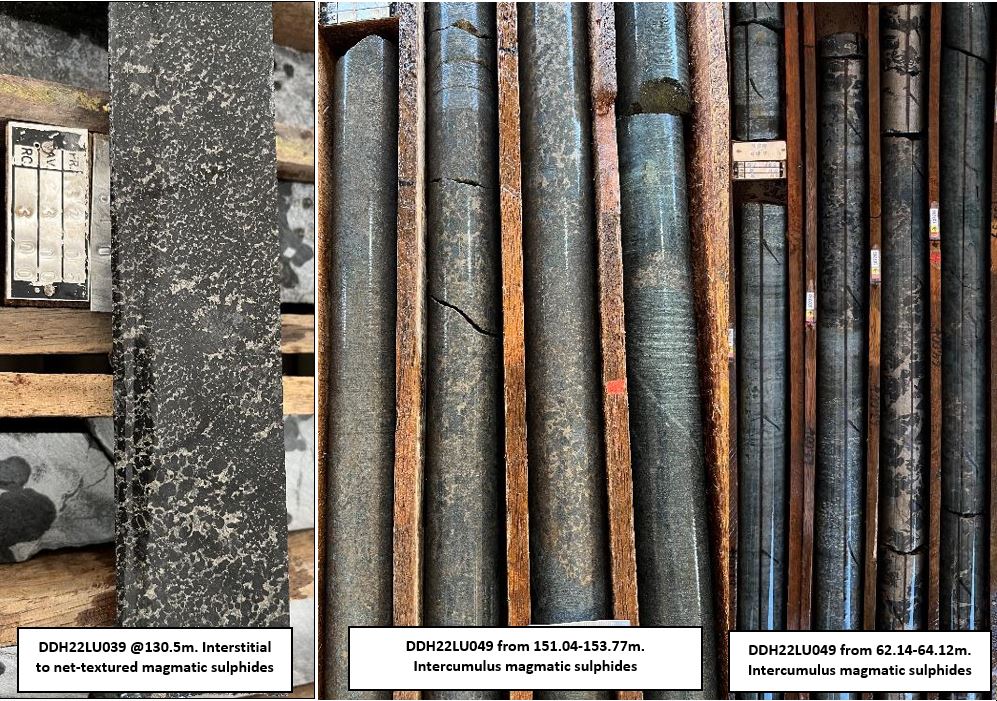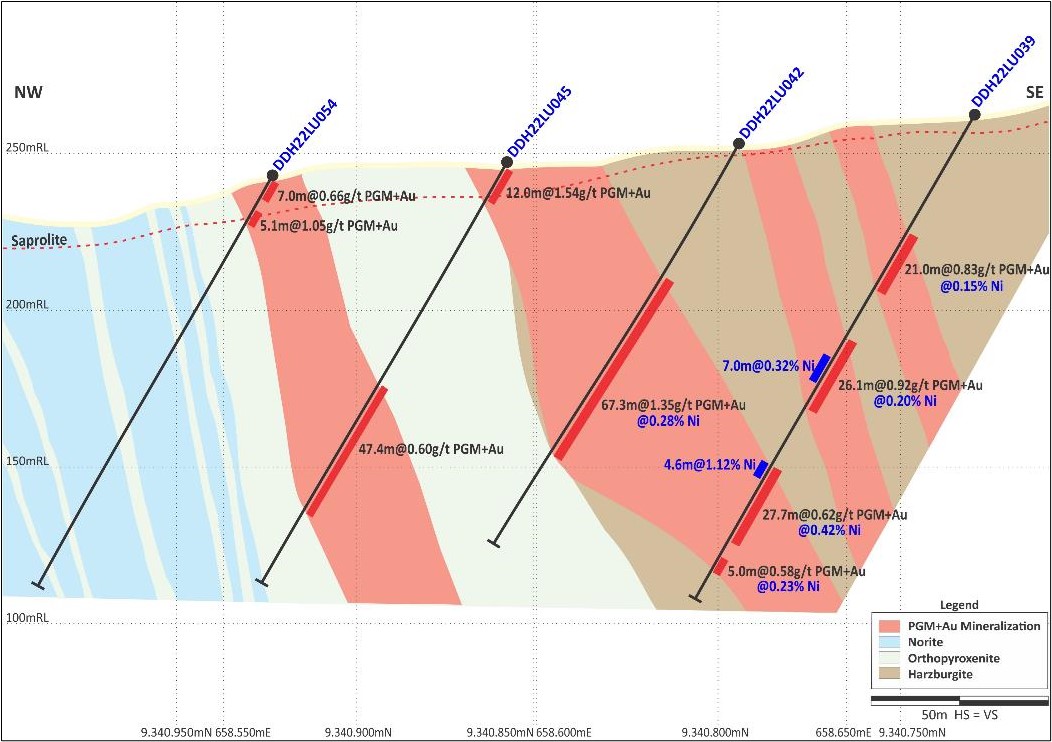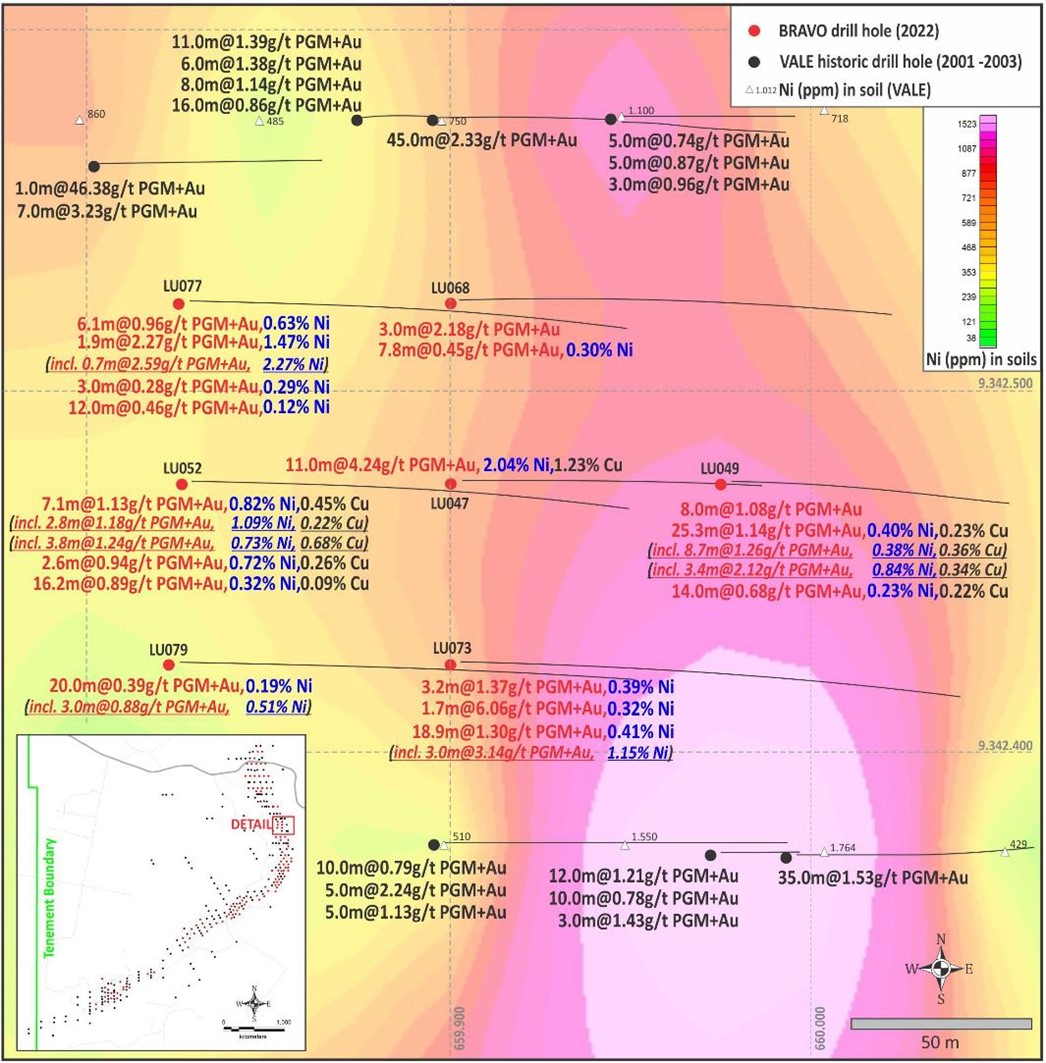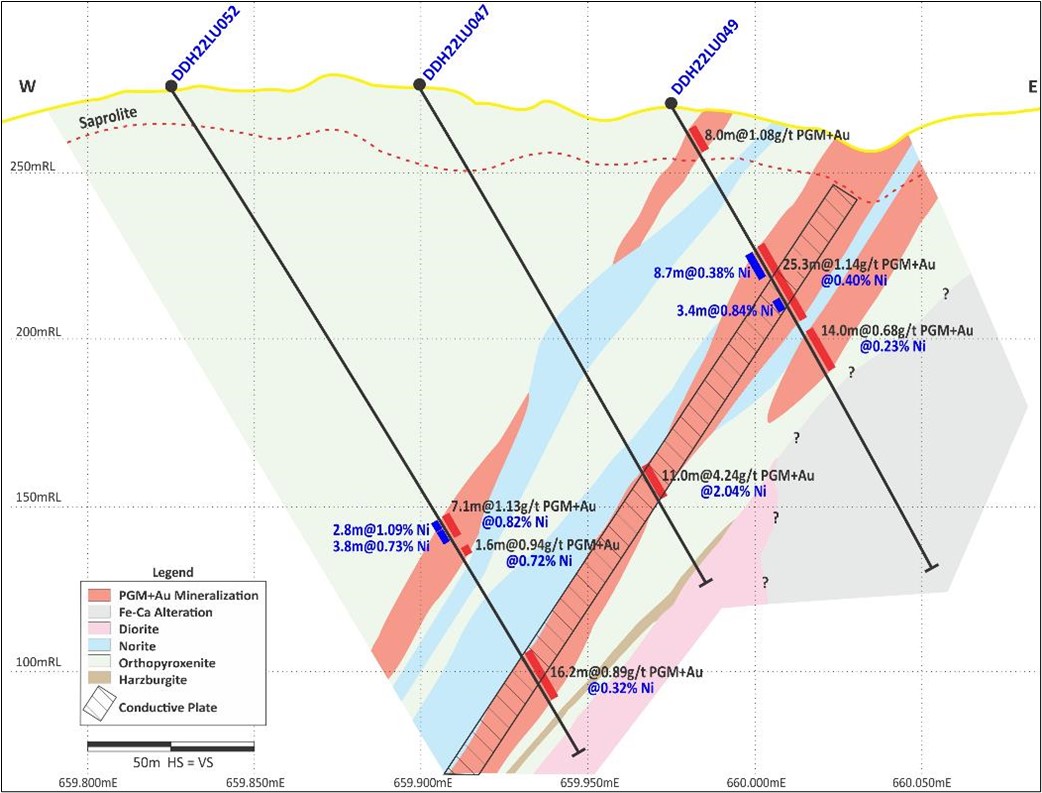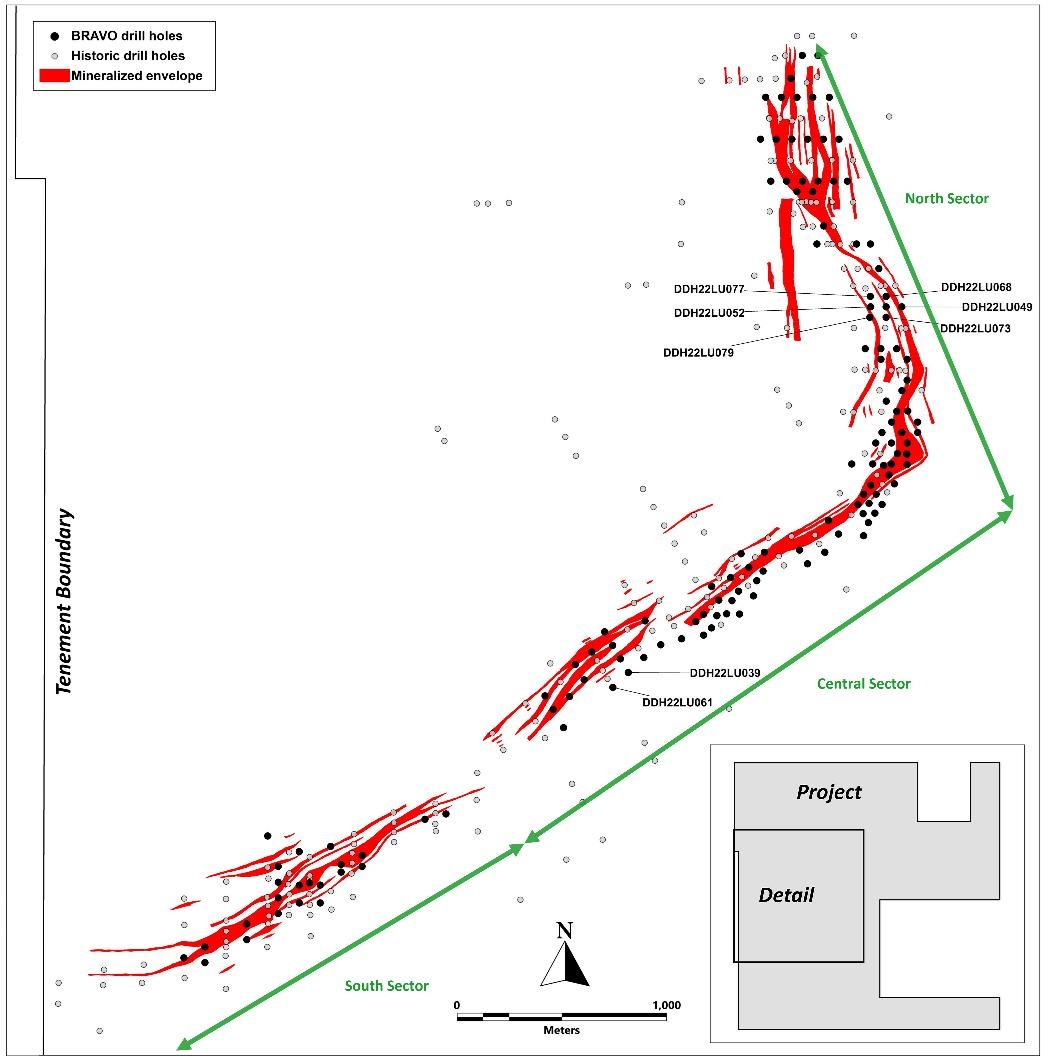Highlights include 27.7m @ 0.62g/t PGM+Au, 0.62% Ni (Including 4.6m @ 1.12g/t PGM+Au plus 1.12% Ni),
And: 25.3m @ 1.14g/t PGM+Au, 0.42% Ni, 0.34% Cu (Including 3.4m @ 2.12g/t PGM+Au, 0.84% Ni, 0.34% Cu)
VANCOUVER, February 14, 2022 – Bravo Mining Corp. (TSX.V: BRVO, OTCQX: BRVMF), (“Bravo” or the “Company”) announced that it has received assay results from eight diamond drill holes (“DDH”) in the Central and North Sectors highlighting the nickel sulphide potential of its 100% owned Luanga palladium + platinum + rhodium + gold + nickel project (“Luanga” or “Luanga PGM+Au+Ni Project”), located in the Carajás Mineral Province, state of Pará, Brazil. Two DDH in the Central Sector have identified a new zone and style of nickel sulphide mineralization. Follow up drilling to the previously announced massive sulphide intercept in the North Sector (August 16th, 2022 news release) has intersected higher-grade nickel sulphide 50m to the north and south, with evidence indicating potential extensions toward the south.
“Today’s results demonstrate the potential for higher-grade nickel ± copper sulphides at Luanga, underlie the existing ~8.1km strike of PGM+Au+Ni mineralization intersected in shallow historic drilling,”said Luis Azevedo, Chairman and CEO of Bravo. “We are at the early stages of understanding the distribution of, and controls on, this potential new style of nickel ± copper sulphide mineralization, which has now been intersected in both the North and Central Sectors,” he said. “We are very positive about the potential below Luanga and have deployed geophysical tools aimed at detecting this style of mineralization. Work is continuing and aims to drill test future geophysical targets in 2023.”
Highlights Include:
- Follow up, step-out drilling to the massive nickel/copper sulphides intercepted in DDH22LU047 (August 16th, 2022 news release)intersected nickel/copper sulphides along strike, 50m to the north and to the south. Electromagnetics (EM) has identified conductors trending to the south where surface EM is ongoing.
- Drilling in the Central Sector of Luanga has intersected a new zone and style ofnickel sulphide mineralization, potentially magmaticnickel sulphide mineralization. It occurs within a different rock-type than the PGM+Au+Ni mineralization at Luanga – further increasing the exploration prospectivity of Luanga. EM surveying is expected to begin shortly.
- A noticeable change in PGM chemistry (significantly higher rhodium to palladium ratio) has been identified in most assay results from both nickel sulphide zones. This also points to a new style of mineralization and provides another possible vector into higher nickel sulphide zones.
| HOLE-ID | From (m) |
To (m) |
Thickness (m) |
Pd (g/t) |
Pt (g/t) |
Rh (g/t) |
Au (g/t) |
PGM + Au (g/t) |
Ni (% Sulphide) |
Cu (%) |
Sector |
|---|---|---|---|---|---|---|---|---|---|---|---|
| DDH22LU039 | 128.2 | 155.9 | 27.7 | 0.40 | 0.10 | 0.11 | 0.01 | 0.62 | 0.42 | Cent. | |
| Including | 128.2 | 132.8 | 4.6 | 0.74 | 0.12 | 0.25 | 0.01 | 1.12 | 1.12 | Cent. | |
| Including | 130.2 | 131.2 | 1.0 | 1.08 | 0.25 | 0.51 | 0.01 | 1.85 | 2.08 | Cent. | |
| DDH22LU049 | 49.6 | 74.9 | 25.3 | 0.68 | 0.22 | 0.13 | 0.12 | 1.14 | 0.40 | 0.2 | North |
| Including | 66.9 | 70.3 | 3.4 | 1.18 | 0.52 | 0.29 | 0.12 | 2.12 | 0.84 | 0.3 | North |
| DDH22LU052 | 151.0 | 158.1 | 7.1 | 0.69 | 0.04 | 0.30 | 0.11 | 1.13 | 0.82 | 0.4 | North |
| Including | 151.0 | 153.8 | 2.8 | 0.76 | 0.02 | 0.39 | 0.01 | 1.18 | 1.09 | 0.2 | North |
| DDH22LU061 | 102.4 | 103.6 | 1.2 | 0.55 | 0.04 | 0.31 | 0.15 | 1.05 | 1.18 | Cent. | |
| DDH22LU073 | 136.9 | 155.8 | 18.9 | 0.96 | 0.29 | 0.02 | 0.02 | 1.30 | 0.41 | North | |
| Including | 150.8 | 153.8 | 3.0 | 2.57 | 0.50 | 0.04 | 0.02 | 3.14 | 1.15 | North | |
| DDH22LU077 | 169.4 | 175.5 | 6.1 | 0.57 | 0.04 | 0.33 | 0.02 | 0.96 | 0.63 | North | |
| Including | 169.4 | 171.3 | 1.9 | 1.33 | 0.05 | 0.84* | 0.04 | 2.27* | 1.47 | North | |
| Including | 170.6 | 171.3 | 0.7 | 1.54 | 0.04 | >1.0* | 0.01 | 2.59* | 2.27 | North |
Notes:
All ‘From’, ‘To’ depths, and ‘Thicknesses’ are downhole.
All intercepts were in fresh rock.
Given the orientation of the hole and the mineralization, the intercepts are estimated to be 85% to 100% of true thickness.
* Includes Rh >1.00g/t result. Overlimit analyses pending.
North = North Sector. Cent. = Central Sector.
** Bravo’s nickel grades are sulphide nickel, and do not include non-recoverable silicate nickel, unlike historic total nickel assays.
Central Sector Magmatic Nickel Sulphide Exploration Upside
Drilling in the Central Sector (holes DDH22LU039 and DDH22LU061) identified a second zone of more concentrated magmatic sulphides, a style of mineralization not previously observed at Luanga in historic drilling. This style of mineralization features net-textures typical of magmatic nickel sulphide mineralization (Figure 1).
Figure 1: Core photos from Central Sector (039) and North Sector (049 and 052) with nickel ± copper sulphide mineralization.
The Central Sector higher-grade magmatic nickel sulphide mineralization appears to be coincident with the main Luanga PGM mineralization but appears to have increasing concentrations of nickel sulphides to depth, while historic nickel-in-soil geochemistry (Figure 2) indicates that nickel sulphide mineralization may be gently diverging away from the strike of the PGM+Au mineralization. This style of mineralization has only been identified in this area of the Luanga deposit to date and is hosted in the basal sequence of harzburgites (ultramafic rocks) that underlie the dominant Luanga orthopyroxenite PGM+Au host rock.
Surface EM completed by Bravo in late 2022 is being extended to the southeast to look deeper into the basal harzburgite sequence (Figure 3) that underlies the main PGM+Au+Ni mineralization, beyond the extent of current drilling.
The Central Zone assay results (reported in this news release) from drill holes DDH22LU039 and DDH22LU061 demonstrate a noticeable change in PGM chemistry, where the Pd:Rh ratios range from 4:1 to <2:1. This is a significant divergence from the majority of existing drill holes across the 8.1km of the main Luanga PGM+Au mineralized zone, where the Pd:Rh ratio is typically ~10:1. There could also be a relationship between magmatic nickel and rhodium (high rhodium values highlighted in the table above). This, combined with the identification of a different host rock, is further supporting evidence of a new style or phase of mineralization that is more typically associated with magmatic nickel sulphide deposits. Mineralization remains open at depth (Figure 3) and along strike.
Figure 2: Nickel sulphide zone in the Central Sector, shown over historic Ni-in-soil geochemistry.
DDH22LU039 is shown in the section below (Figure 3), where the concentration of magmatic nickel sulphides and nickel assay grades increase (from west to east) from DDH22LU054 where fresh rock mineralization has no significant nickel to report, to DDH22LU039 where magmatic nickel sulphides and assay grades reach their current peak.
Figure 3: Central Zone cross section showing the increase in nickel grade to the southeast (open at depth).
Follow Up on North Sector Massive Magmatic Nickel ± Copper SulphideDiscovery
Follow up drilling to the north and south of the previously announced massive magmatic nickel ± copper sulphide mineralization in DDH22LU047 (August 16th, 2022 news release) in the North Sector has continued to intersect magmatic nickel sulphide mineralization.
New drill results indicate that the nickel ± copper mineralization is coincident with the main Luanga PGM+Au+Ni deposit, but that higher concentrations of nickel and copper are at depth. Alternatively, this mineralization style may be unrelated to the emplacement of the PGM portion of Luanga and related to a different, as yet unidentified, phase of mineralization at depth.
Higher-grade sulphide mineralization and EM anomalism is open to the south (Figure 4) but appears to taper off to the north. Like the Central Sector above, it may also be diverging away from the strike of the PGM+Au mineralization and occur below historic drilling to the south. This interpretation is supported to the southern limit of the current EM survey and is coincident with historic nickel-in-soil geochemistry (Figures 4 and 5).
Most assay results demonstrate the same noticeable change in PGM chemistry as the higher-grade magmatic sulphide mineralization intersected in the Central Zone, with Pd:Rh ratios ranging from to 5:1 to <2:1. As highlighted above this may indicate potential for a different phase or style of mineralization at depth.
Figure 4: Nickel ± copper sulphide zone in the North Sector, shown over historic Ni-in-soil geochemistry.
Figure 5: North Sector Cross Section showing new drill holes DDH22LU052 and DDH22LU049 (open at depth).
Luanga Drill Program Progress
A total of 144 drill holes (9 in 2023) have been completed by Bravo to date, for 23,950 metres (94% of the planned 25,500 metre Phase 1 Drilling Program), including all 8 planned twin holes (results for 2 twin holes outstanding) and all 8 metallurgical holes (not for routine assaying). Results have been reported for 60 Bravo drill holes to date.
Results for 76 Bravo drill holes are currently outstanding.
The Phase 1 diamond drill program is close to completion, with 1,550m remaining before the commencement of the Phase 2 diamond drill program. The Phase 2 program will be focused on step out drilling (with the objective of extending known zones of PGM+Au+Ni mineralization to depth), follow-up on the newly identified higher-grade nickel ± copper magmatic sulphide mineralization styles, as well as exploration of new targets.
Aside from systematic step-out drilling, the Phase 2 program is designed to support a more intensive approach to exploration, with work to focus on exploring for magmatic nickel ± copper sulphides. This program will commence with an extensive program of geophysics consisting of ground EM, ground micro-gravity and ground magnetics. Targets generated would be drill tested during the Phase 2 program. Phase 2 will also include ongoing metallurgical test work designed to confirm and optimize metallurgical results reported by Vale SA., Luanga’s previous owner.
The key deliverable expected from the Phase 1 program is Luanga’s maiden NI 43-101 Mineral Resource Estimate (MRE). Approximately 3,600m of priority drilling remains to be completed to facilitate this work, including the balance of the Phase 1 program and a portion of the Phase 2 program. Completion of the maiden MRE remains on track for H2/2023.
Complete Table of Recent Intercepts
| HOLE-ID | From (m) |
To (m) |
Thickness (m) |
Pd (g/t) |
Pt (g/t) |
Rh (g/t) |
Au (g/t) |
PGM + Au (g/t) |
Ni (% Sulphide) |
Cu (%) |
TYPE |
|---|---|---|---|---|---|---|---|---|---|---|---|
| DDH22LU039 | 41.2 | 61.2 | 21.0 | 0.54 | 0.19 | 0.00 | 0.11 | 0.83 | 0.15 | FR | |
| And | 80.1 | 106.2 | 26.1 | 0.56 | 0.22 | 0.00 | 0.14 | 0.92 | 0.20 | FR | |
| Including | 91.2 | 98.2 | 7.0 | 0.44 | 1.11 | 0.01 | 0.17 | 1.72 | 0.32 | FR | |
| And | 128.2 | 155.9 | 27.7 | 0.40 | 0.10 | 0.11 | 0.01 | 0.62 | 0.42 | FR | |
| Including | 128.2 | 132.8 | 4.6 | 0.74 | 0.12 | 0.25 | 0.01 | 1.12 | 1.12 | FR | |
| Including | 130.2 | 131.2 | 1.0 | 1.08 | 0.25 | 0.51 | 0.01 | 1.85 | 2.08 | FR | |
| And | 161.9 | 166.9 | 5.0 | 0.35 | 0.15 | 0.07 | 0.01 | 0.58 | 0.23 | FR | |
| DDH22LU049 | 8.7 | 16.7 | 8.0 | 0.71 | 0.26 | 0.02 | 0.10 | 1.08 | NA | Ox | |
| And | 49.6 | 74.9 | 25.3 | 0.68 | 0.22 | 0.13 | 0.12 | 1.14 | 0.40 | 0.23 | FR |
| Including | 49.6 | 58.3 | 8.7 | 0.79 | 0.19 | 0.09 | 0.19 | 1.26 | 0.38 | 0.36 | FR |
| Also Including | 66.9 | 70.3 | 3.4 | 1.18 | 0.52 | 0.29 | 0.12 | 2.12 | 0.84 | 0.34 | FR |
| And | 78.4 | 92.4 | 14.0 | 0.42 | 0.14 | 0.04 | 0.08 | 0.68 | 0.23 | 0.22 | FR |
| DDH22LU052 | 151.0 | 158.1 | 7.1 | 0.69 | 0.04 | 0.30 | 0.11 | 1.13 | 0.82 | 0.45 | FR |
| Including | 151.0 | 153.8 | 2.8 | 0.76 | 0.02 | 0.39 | 0.01 | 1.18 | 1.09 | 0.22 | FR |
| Also Including | 154.3 | 158.1 | 3.8 | 0.73 | 0.05 | 0.27 | 0.19 | 1.24 | 0.73 | 0.68 | FR |
| And | 161.9 | 164.5 | 2.6 | 0.58 | 0.06 | 0.28 | 0.01 | 0.94 | 0.72 | 0.26 | FR |
| And | 199.0 | 215.2 | 16.2 | 0.40 | 0.46 | 0.03 | 0.01 | 0.89 | 0.32 | 0.09 | FR |
| DDH22LU061 | 59.3 | 65.8 | 6.5 | 0.49 | 0.19 | 0.00 | 0.13 | 0.81 | 0.09 | FR | |
| And | 88.5 | 91.5 | 3.0 | 0.90 | 0.30 | 0.00 | 0.24 | 1.44 | 0.19 | FR | |
| And | 102.4 | 103.6 | 1.2 | 0.55 | 0.04 | 0.31 | 0.15 | 1.05 | 1.18 | FR | |
| And | 121.3 | 127.3 | 6.0 | 0.26 | 0.14 | 0.03 | 0.09 | 0.52 | 0.21 | FR | |
| And | 139.0 | 150.8 | 11.8 | 0.27 | 0.10 | 0.02 | 0.02 | 0.41 | 0.18 | FR | |
| DDH22LU068 | 39.5 | 42.5 | 3.0 | 1.35 | 0.73 | 0.10 | 0.01 | 2.18 | 0.07 | FR | |
| And | 54.4 | 62.2 | 7.8 | 0.33 | 0.10 | 0.02 | 0.01 | 0.45 | 0.30 | FR | |
| DDH22LU073 | 113.6 | 116.8 | 3.2 | 0.89 | 0.44 | 0.03 | 0.01 | 1.37 | 0.39 | FR | |
| And | 127.8 | 129.5 | 1.7 | 0.89 | 5.11 | 0.05 | 0.01 | 6.06 | 0.32 | FR | |
| And | 136.9 | 155.8 | 18. 9 | 0.96 | 0.29 | 0.02 | 0.02 | 1.30 | 0.41 | FR | |
| Including | 150.8 | 153.8 | 3.0 | 2.57 | 0.50 | 0.04 | 0.02 | 3.14 | 1.15 | FR | |
| DDH22LU077 | 169.4 | 175.5 | 6.1 | 0.57 | 0.04 | 0.33 | 0.02 | 0.96 | 0.63 | FR | |
| And | 169.4 | 171.3 | 1.9 | 1.33 | 0.05 | 0.84* | 0.04 | 2.27* | 1.47 | FR | |
| Including | 170.6 | 171.3 | 0.7 | 1.54 | 0.04 | >1.0* | 0.01 | 2.59* | 2.27 | FR | |
| And | 204.1 | 207.1 | 3.0 | 0.27 | 0.01 | 0.00 | 0.01 | 0.28 | 0.29 | FR | |
| And | 220.1 | 232.1 | 12.0 | 0.28 | 0.13 | 0.02 | 0.03 | 0.46 | 0.12 | FR | |
| DDH22LU079 | 179.3 | 199.3 | 20.0 | 0.23 | 0.11 | 0.04 | 0.01 | 0.39 | 0.19 | FR | |
| including | 196.3 | 199.3 | 3.0 | 0.58 | 0.18 | 0.12 | 0.01 | 0.88 | 0.51 | FR |
Notes:
All ‘From’, ‘To’ depths, and ‘Thicknesses’ are downhole.
Given the orientation of the hole and the mineralization, the intercepts are estimated to be 85% to 100% of true thickness.
Type: Ox = Oxide. LS = Low Sulphur. FR = Fresh Rock. Recovery methods and results will differ based on the type of mineralization.
* = Includes Rh >1.00g/t result. Overlimit analyses pending.
** = Bravo’s nickel grades are sulphide nickel, and do not include non-recoverable silicate nickel, unlike historic total nickel assays
Figure 6: Location of Bravo Drilling Reported in this News Release
About Bravo Mining Corp.
Bravo is a Canada and Brazil-based mineral exploration and development company focused on advancing its Luanga PGM+Au+Ni Project in the world-class Carajás Mineral Province of Brazil.
The Luanga Project benefits from being in a location close to operating mines, with excellent access and proximity to existing infrastructure, including road, rail and clean and renewable hydro grid power. The project area was previously de-forested for agricultural grazing land. Bravo’s current Environmental, Social and Governance activities includes replanting trees in the project area, hiring and contracting locally, and ensuring protection of the environment during its exploration activities.
Technical Disclosure
Technical information in this news release has been reviewed and approved by Simon Mottram, F.AusIMM (Fellow Australia Institute of Mining and Metallurgy), President of Bravo Mining Corp. who serves as the Company’s “qualified person”, as defined in National Instrument 43-101 Standards of Disclosure for Mineral Projects (“NI 43-101”). Mr. Mottram has verified the technical data and opinions contained in this news release.
For further information about Bravo, please visit www.bravomining.com or contact:
Alex Penha
EVP Corporate Development
info@bravomining.com
Forward Looking Statements
This news release contains forward-looking information which is not comprised of historical facts. Forward-looking information is characterized by words such as “rich”, “extends”, “new zone”, “potential”, “higher-grade”, “very positive”, “concentrated”, “noticeable change”, “majority”, “new style”, “significant”, “intensive approach”, “extensive”, “optimize”, “yet unidentified”, “objective” and other similar words, phrases, or statements that certain events or conditions “may”, “should”, “will” or “would” occur. This news release contains forward-looking information pertaining to the Company’s ongoing re-sampling and drill programs and the results thereof; the expected completion of geophysical surveys and the results of such surveys; the potential for the definition o new styles of mineralization and extensions to depth and the Company’s plans in respect thereof. Forward-looking information involves risks, uncertainties and other factors that could cause actual events, results, and opportunities to differ materially from those expressed or implied by such forward-looking information. Factors that could cause actual results to differ materially from such forward-looking information include, but are not limited to, unexpected results from exploration programs, changes in the state of equity and debt markets, fluctuations in commodity prices, delays in obtaining required regulatory or governmental approvals, environmental risks, limitations on insurance coverage; and other risks and uncertainties involved in the mineral exploration and development industry. Forward-looking information in this news release is based on the opinions and assumptions of management considered reasonable as of the date hereof, including, but not limited to, the assumption that the assay results confirm that the interpreted mineralization contains significant values of nickel, PGMs and Au; that the mineralization remains open to depth, that grades are improving to depth, that final drill and assay results will be in line with management’s expectations; that activities will not be adversely disrupted or impeded by regulatory, political, community, economic, environmental and/or healthy and safety risks; that the Luanga Project will not be materially affected by potential supply chain disruptions; and general business and economic conditions will not change in a materially adverse manner. Although the Company believes that the assumptions and factors used in preparing the forward-looking information in this news release are reasonable, undue reliance should not be placed on such information. The Company disclaims any intention or obligation to update or revise any forward-looking information, other than as required by applicable securities laws.
Schedule 1: Drill Hole Collar Details
| HOLE-ID | Company | East (m) |
North (m) |
RL (m) |
Datum | Depth (m) |
Azimuth | Dip | Sector |
|---|---|---|---|---|---|---|---|---|---|
| DDH22LU039 | Bravo | 658669.93 | 9340730.09 | 262.74 | SIRGAS2000 UTM22S | 177.70 | 330.00 | -60.00 | Central |
| DDH22LU049 | Bravo | 659975.11 | 9342475.00 | 270.59 | SIRGAS2000 UTM22S | 159.30 | 90.00 | -60.00 | North |
| DDH22LU052 | Bravo | 659825.80 | 9342475.01 | 274.16 | SIRGAS2000 UTM22S | 233.20 | 90.00 | -60.00 | North |
| DDH22LU061 | Bravo | 658595.91 | 9340659.10 | 271.55 | SIRGAS2000 UTM22S | 191.00 | 330.00 | -60.00 | Central |
| DDH22LU068 | Bravo | 659900.11 | 9342525.01 | 280.91 | SIRGAS2000 UTM22S | 251.00 | 90.00 | -60.00 | North |
| DDH22LU073 | Bravo | 659900.09 | 9342425.00 | 273.40 | SIRGAS2000 UTM22S | 270.85 | 90.00 | -60.00 | North |
| DDH22LU077 | Bravo | 659824.96 | 9342524.96 | 279.74 | SIRGAS2000 UTM22S | 264.20 | 90.00 | -60.00 | North |
| DDH22LU079 | Bravo | 659822.30 | 9342425.01 | 270.84 | SIRGAS2000 UTM22S | 250.50 | 90.00 | -60.00 | North |
Schedule 2: Assay Methodologies and QAQC
Samples follow a chain of custody between collection, processing, and delivery to the ALS laboratory in Parauapebas, state of Pará, Brazil. The drill core is delivered to the core shack at Bravo’s Luanga site facilities and processed by geologists who insert certified reference materials, blanks, and duplicates into the sampling sequence. Drill core is half cut and placed in secured polyurethane bags, then in security-sealed sacks before being delivered directly from the Luanga site facilities to the Parauapebas ALS laboratory by Bravo staff. Additional information about the methodology can be found on the ALS global website (ALS) in the analytical guides.
Quality Assurance and Quality Control (“QAQC”) is maintained internally at the lab through rigorous use of internal certified reference materials, blanks, and duplicates. An additional QAQC program is administered by Bravo using certified reference materials, duplicate samples and blank samples that are blindly inserted into the sample batch. If a QAQC sample returns an unacceptable value an investigation into the results is triggered and when deemed necessary, the samples that were tested in the batch with the failed QAQC sample are re-tested.
| Bravo ALS | |||||
|---|---|---|---|---|---|
| Preparation | Method | Method | Method | Method | Method |
| For All Elements | Pt, Pd, Au | Rh | Ni-Sulphide | Cu | Trace Elements |
| PREP-31DH | PGM-ICP27 | Rh-MS25 | Ni-ICP05 | OG-62 | ME-ICP61 |

